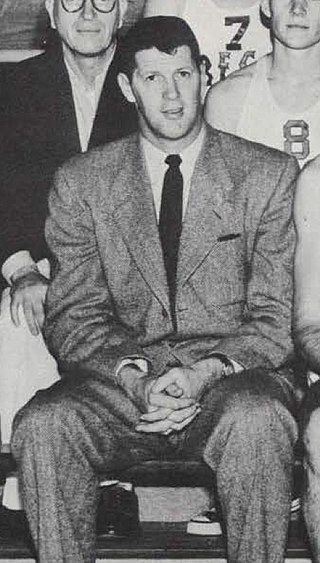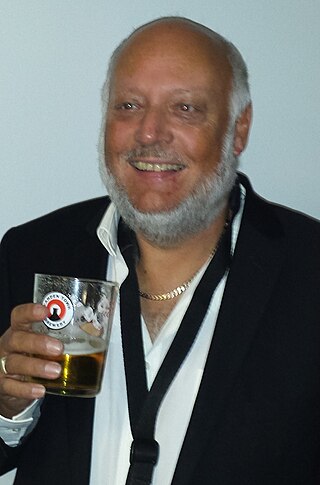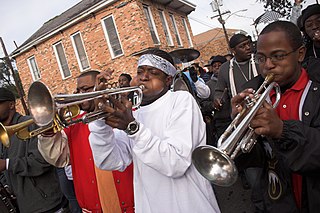Related Research Articles

The Original Dixieland Jass Band (ODJB) was a Dixieland jazz band that made the first jazz recordings in early 1917. Their "Livery Stable Blues" became the first jazz record ever issued. The group composed and recorded many jazz standards, the most famous being "Tiger Rag". In late 1917, the spelling of the band's name was changed to Original Dixieland Jazz Band.

Edward "Kid" Ory was an American jazz composer, trombonist and bandleader. One of the early users of the glissando technique, he helped establish it as a central element of New Orleans jazz.

Pierre Dewey LaFontaine Jr., known professionally as Pete Fountain, was an American jazz clarinetist.
Jazz standards are musical compositions that are an important part of the musical repertoire of jazz musicians, in that they are widely known, performed, and recorded by jazz musicians, and widely known by listeners. There is no definitive list of jazz standards, and the list of songs deemed to be standards changes over time. Songs included in major fake book publications and jazz reference works offer a rough guide to which songs are considered standards.

Jazz music has a long history in Australia. Over the years jazz has held a high-profile at local clubs, festivals and other music venues and a vast number of recordings have been produced by Australian jazz musicians, many of whom have gone on to gain a high profile in the international jazz arena.
The Sacramento Music Festival was held every Memorial Day weekend in Sacramento, California. It was organized by the Sacramento Traditional Jazz Society since 1974. The final festival was in 2017.

"Tiger Rag" is a jazz standard that was recorded and copyrighted by the Original Dixieland Jass Band in 1917. It is one of the most recorded jazz compositions. In 2003, the 1918 recording of "Tiger Rag" was entered into the U.S. Library of Congress National Recording Registry.
Graeme Emerson Bell, AO, MBE was an Australian Dixieland and classical jazz pianist, composer and band leader. According to The Age, his "band's music was hailed for its distinctive Australian edge, which he describes as 'nice larrikinism' and 'a happy Aussie outdoor feel'".
Johnny Varro is a pianist with roots in the swing style of jazz. He is also a leader and arranger.

Sherwood "Shakey" Johnson was an American jazz patron and the founder in 1954 of Shakey's Pizza, which hosted live jazz-oriented music nightly.

William J. Borcher was an American basketball coach, the head coach at the University of Oregon from 1951 to 1956.

Pete Allen is an English Dixieland jazz clarinettist, alto and soprano saxophonist, banjo, bandleader, and vocalist. He has appeared in television and radio shows, both with his band and as a solo act. He has worked with Peanuts Hucko, Bud Freeman, Bob Wilber, Marty Grosz, Billy Butterfield, Barrett Deems, Jack Lesberg, and Kenny Ball.
The Uptown Lowdown Jazz Band was an American Dixieland jazz band from the Bellevue, Washington area, active for forty-seven years, from 1971 until 2018. It was founded and led by cornetist Bert Barr (1945-2019).

The music of New Orleans assumes various styles of music which have often borrowed from earlier traditions. New Orleans, Louisiana, is especially known for its strong association with jazz music, universally considered to be the birthplace of the genre. The earliest form was dixieland, which has sometimes been called traditional jazz, 'New Orleans', and 'New Orleans jazz'. However, the tradition of jazz in New Orleans has taken on various forms that have either branched out from original dixieland or taken entirely different paths altogether. New Orleans has also been a prominent center of funk, home to some of the earliest funk bands such as The Meters.

David Friedrich Dallwitz was a South Australian jazz and classical musician, bandleader, composer, painter, and art teacher whose work spanned almost seven decades. He led jazz, Dixieland, and ragtime bands, and performed with classical chamber music groups.
Richard Durant Cary was an American jazz trumpeter, composer and arranger.
Dixieland jazz, also referred to as traditional jazz, hot jazz, or simply Dixieland, is a style of jazz based on the music that developed in New Orleans at the start of the 20th century. The 1917 recordings by the Original Dixieland Jass Band, fostered awareness of this new style of music.
The Castle Jazz Band was a Dixieland jazz band, part of the "West Coast revival" of traditional jazz music. Their recordings were popular worldwide for a time, although touring outside their Portland, Oregon base was limited.

William (Bill) Julius Theodore Reinhardt was an American clarinetist, bandleader and the owner of Jazz, Ltd.—the first Jazz club run by a musician in Chicago and one of the longest running Dixieland jazz clubs in the country. He also played tenor saxophone, French horn and sang. Unlike many of the famous jazz musicians that Bill employed in his band, he did not seek fame; he was content with the great success of his nightclub. However, by the 1960s his band did appear on two TV programs.